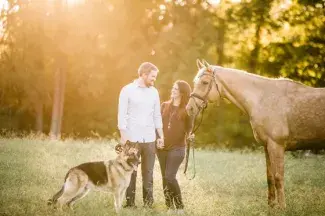
Is Your Pet Part of Your Estate Planning
More U.S. households today own pets than ever before—a full 70%, up from 56% back in the late 1980s. And more than 23 million households (about one in five) adopted a pet during the pandemic.
If you’re a part of that large group—made up of roughly 90 million families—you probably consider your pet an important member of the family that you love deeply. Example: A study by Consumer Affairs surveyed 1,000 pet owners and found that 57% of participants ages 27 to 42 love their furry friends more than their siblings.
But have you considered what could happen to that cherished family member if you were to die suddenly? And have you taken any steps to ensure your beloved dog, cat, horse or other animal will be well taken care of if you’re not around to do the job?
If not, don’t panic—it’s not an issue many of us think about. That said, it’s probably time to make your treasured pet part of your estate plan.
Initial steps
1. Identify your wishes and intentions. Decide how you would want someone else to take care of your pet—types of food you want (and don’t want) the pet to eat, preferred vets and medical care, etc. You’ll need to be clear about your wishes in order to communicate them to a chosen caregiver.
2. Choose a caregiver. A good pet guardian is someone you believe will be as good to your pet as you have been. Be sure the candidate is willing and able to be the pet guardian and take on the duties you expect him or her to take on. Discuss with any candidate your expectations for care and whether that person is on board with your needs (or whether you’re willing to compromise in certain areas). It’s probably best, if possible, to identify a few candidates so you have backups.
3. Factor in the financial considerations. Make sure you and the future pet guardian understand, as best as possible, the likely costs of pet care (more on that later). Does your cat eat special food that costs significantly more than grocery store options? Does your horse have physical health issues that need attention, medication or professional care? Is your dog a type of breed that is known for encountering health problems later in life, and how much might it cost to treat such problems? Answering questions like these now can help ensure that everyone involved in caring for your pet is clear about what may be required.
CRAFTING A PET PLAN
You have three main options for safeguarding the care of your pets:
1. Pet care agreement. A pet care agreement is a contract you make with another person who has agreed to care for your pet in case of your death. This type of formal agreement will be enforceable. It should spell out the specific care you want for your pet as well as how any money you have arranged for that care is to be handled.
2. Pet trust. A pet trust is also a legally enforceable arrangement that helps ensure your pet care wishes are honored. As with the pet care agreement, you will need to identify a willing and able pet guardian. But you will also need someone to administer the trust—a trustee.
You can establish a pet trust now or upon your death. Either way, you need to fund the trust for the care of your pet. This often entails coming up with some number to ensure a certain standard of living for your pet. The trust will detail the types and level of care as well as how money is to be dispersed from the trust (for your pet and possibly for the pet guardian’s compensation for his or her efforts).
Warning: Your pet trust must comply with your state’s laws. A description of each state law is available at www.aspca.org/pet-care/pet-planning/pet-trust-laws.
3. Will bequest. Your will determines how your assets will be divided and allocated after you die. Because a pet is considered property in the eyes of the law, your will can stipulate who becomes its guardian and the amount of money that will be set aside for its care. Here again, you will need to identify a guardian, provide instructions for care and spell out the monetary arrangements. And, as with a pet trust, make sure the pet provisions in your will work in your state.
The financial side of your pet’s care
It is often worthwhile to provide the funding for the care of your pet after you’re gone. Thus, you need to calculate the amount needed for the care you prefer for your pet. Some considerations include:
- The cost of caring for your pet and the pet’s life expectancy. Some pets (such as macaws and cockatoos) can live more than 50 years.
- Medical costs as the pet ages.
- Boarding facility costs (if you have a horse, for example).
- The cost of any pet health insurance you may choose to have.
- Compensation (if any) for the caregiver for his or her efforts.
Important: If the pet dies and there’s money remaining—in the pet trust, for example—you’ll want to specify where those funds go.
Ultimately, you don’t have to be extremely wealthy to do some basic (or even advanced) estate planning that involves your pet. If you’re interested in making arrangements to have your pet taken care of after you’re gone, talk with your financial advisor about the best ways to accomplish that goal. Or if it’s been a few years since you last revisited your existing pet estate plan, give it a review to ensure it still meets your needs.
ACKNOWLEDGMENT: This article was published by the VFO Inner Circle, a global financial concierge group working with affluent individuals and families and is distributed with its permission. Copyright 2024 by AES Nation, LLC.
This report is intended to be used for educational purposes only and does not constitute a solicitation to purchase any security or advisory services. Past performance is no guarantee of future results. An investment in any security involves significant risks and any investment may lose value. Refer to all risk disclosures related to each security product carefully before investing. Securities offered through Alliance Global Partners. Thomas Dowling is a registered representative of Alliance Global Partners. Thomas Dowling and Alliance Global Partners are not affiliated with AES Nation, LLC. AES Nation, LLC is the creator and publisher of the VFO Inner Circle Flash Report.

